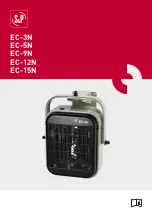
WARNING
Fire and Explosion Hazard
■
Not for home or recreational vehicle use.
■
Installation of this heater in a home or
recreational vehicle may result in a fire or
explosion.
■
Fire or explosions can cause property
damage or loss of life.
FOR YOUR SAFETY
If you smell gas:
1. Open windows.
2. Don't touch electrical switches.
3. Extinguish any open flame.
4. Immediately call your gas supplier.
FOR YOUR SAFETY
Do not store or use gasoline or other
flammable vapors and liquids in the vicinity of
this or any other appliance.
WARNING
Fire and Explosion Hazard
■
Keep solid combustibles a safe distance
away from the heater.
■
Solid combustibles include wood or paper
products, building materials and dust.
■
Do not use the heater in spaces which
contain or may contain volatile or airborne
combustibles.
■
Volatile or airborne combustibles include
gasoline, solvents, paint thinner, dust
particles or unknown chemicals.
■
Failure to follow these instructions may
result in a fire or explosion.
■
Fire or explosions can lead to property
damage, personal injury or loss of life.
GENERAL HAZARD WARNING
■
Failure to comply with the precautions and instructions provided with this heater, can result in:
— Death
— Serious bodily injury or burns
— Property damage or loss from fire or explosion
— Asphyxiation due to lack of adequate air supply or carbon monoxide poisoning
— Electrical shock
■
Read this Owner’s Manual before installing or using this product.
■
Only properly-trained service people should repair or install this heater.
■
Save this Owner’s Manual for future use and reference.
■
Owner’s Manuals and replacement labels are available at no charge. For assistance, contact
L.B. White at 800-345-7200.
WARNING
■
Proper gas supply pressure must be provided to the inlet of the heater.
■
Refer to data plate for proper gas supply pressure.
■
Gas pressure in excess of the maximum inlet pressure specified at the heater inlet can cause
fires or explosions.
■
Fires or explosions can lead to serious injury, death, or building damage.
■
Gas pressure below the minimum inlet pressure specified at the heater inlet may cause
improper combustion.
■
Improper combustion can lead to asphyxiation or carbon monoxide poisoning and therefore
serious injury or death.
22



































